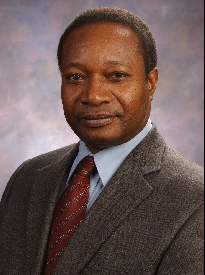International Recognition for WIU Crime Professor
March 8, 2006

Bonny Mhlanga
[Download Print-Quality Image]
MACOMB, IL - - Crime show writers beware. Bonny Mhlanga, an assistant professor in Western Illinois Universitys law enforcement and justice administration department, knows how to get law breakers to talk and to tell the truth, in a 30-minute face-to-face interview.
The innovative methodology, which he documented as the lead researcher of the paper Levels of Self-Report Offending and Drug Use Among Offenders: Findings from the Criminality Surveys, earned him the Best Newcomer award at the 2001 Market Research Society Conference in Brighton, England. The paper, which also earned him personal congratulations from Prime Minister Tony Blairs government, is on the Home Office website at www.homeoffice.gov.uk/rds/pdfs05/rdsolr1805.pdf.
Previously, the preliminary results of the study were published by the prestigious International Journal of Market Research (March 2001) as A Life of Crime: The Hidden Truth About Criminal Activity.
Mhlanga came to teach statistics at Western Illinois two years ago from England, where he had been a senior research officer for five years with the United Kingdom Home Office Research, Development and Statistics Directorate. That position would be equivalent to a senior researcher in the U.S. Department of Justice National Institute of Justice, he said.
The research, which was the first of its kind in the United Kingdom, looked at the number of crimes committed by an individual offender before his/her current conviction as well as drug use patterns related to crimes. Sex offenders were excluded from the study.
Trained interviewers questioned the criminals, who had use of a newly developed Life Events Calendar (LEC), which listed major holidays and other life events or situations, as a cognitive prompt to encourage accurate recall of their behavior during the survey reference period.
The major aims of the study were to estimate the proportion of crime that had been committed by those who had been dealt with through the criminal justice system; measure the number of crimes prevented by giving offenders a custodial sentence; and then related the offending data to demographic, social, economic, criminological and lifestyle factors, Mhlanga said.
Data collected and analyzed from the 1,884 respondents showed 59 percent of offenders did not possess a high school diploma or had dropped out of school; 66 percent were 16 years old or younger when they first started offending and 29 percent were between 11-14 years old; and drugs taken the past 12 months included cannabis (65%), cocaine (32%), heroin (31%), crack (31) and ecstasy (30%), Mhlanga said. Nearly one-third of all respondents were poly-drug users, with the most popular combinations being cannabis-cocaine (28%), cannabis-ecstasy (28%), cannabis-crack (27%) and cannabis-heroin (27%). Thirty-two percent of offending was connected with the need for money to buy drugs.
Professor Mhlanga is one of the finest scholars of crime that I have ever met. His knowledge of crime in England and America is unsurpassed, said colleague Tom Tomlinson, director of Westerns Center for International Studies and a law enforcement and justice administration (LEJA) professor.
His international experiences and credentials are a great asset to the University; we are fortunate to have him as a faculty member, added Tomlinson, who had befriended Mhlanga on previous study trips to England, where he had guided Western LEJA students.
Mhlanga had been in England more than 30 years, moving there from his native Zimbabwe, and the struggles of apartheid, in the early 1970s, after earning a diploma in social work from the University of Zimbabwe (1971).
He continued his education at the University of Surrey (United Kingdom) where he earned a postgraduate diploma in social administration (1980), a certificate of qualification in social work (1981), a M.S. in applied social studies (1983) and a Ph.D. in criminal justice (1993).
Mhlanga conducted pioneering research into the decision-making process by the United Kingdom Crown Prosecution Service (CPS) to prosecute young offenders as the ESRC (Economic and Social Research Council) Postdoctoral Fellow in Criminology at the Centre for Criminology and Criminal Justice, The University of Hull from 1995 to 1998. The study, which is regarded as one of the most comprehensive studies of its kind, gained international mainstream media attention.
I am very happy to be Western Illinois University; I feel very comfortable, Mhlanga said. I think Ive found my niche. I really enjoy teaching.
I feel I reached the peak of my career in the UK, and when my friend Tom Tomlinson called and said there was a position open at Western, I applied, he added.
Mhlanga has not lost is passion for research, though.
I am applying for a grant to repeat the self-reporting offending and drug use study in Illinois. That would enable us to make international comparisons of offending between the U.S. and the UK, he said. He hopes to start the Illinois project in 2006-07.
Mhlanga, who has been a Research Fellow in the Brunel University (UK) department of law and a juvenile justice practitioner in Reading (UK), Chicago and London, is a member of the American and the British Societies of Criminology.
Posted By: University Communications (U-Communications@wiu.edu)
Office of University Communications & Marketing

Connect with us: